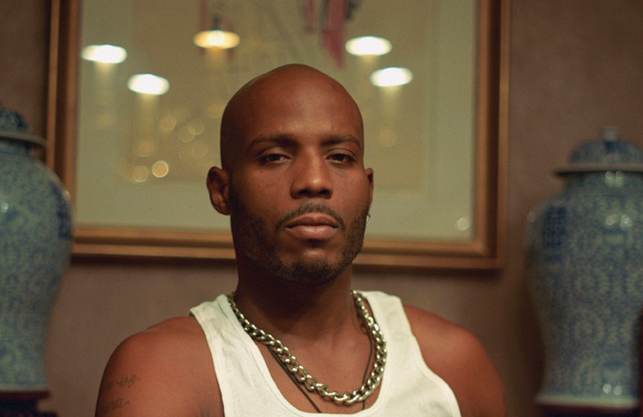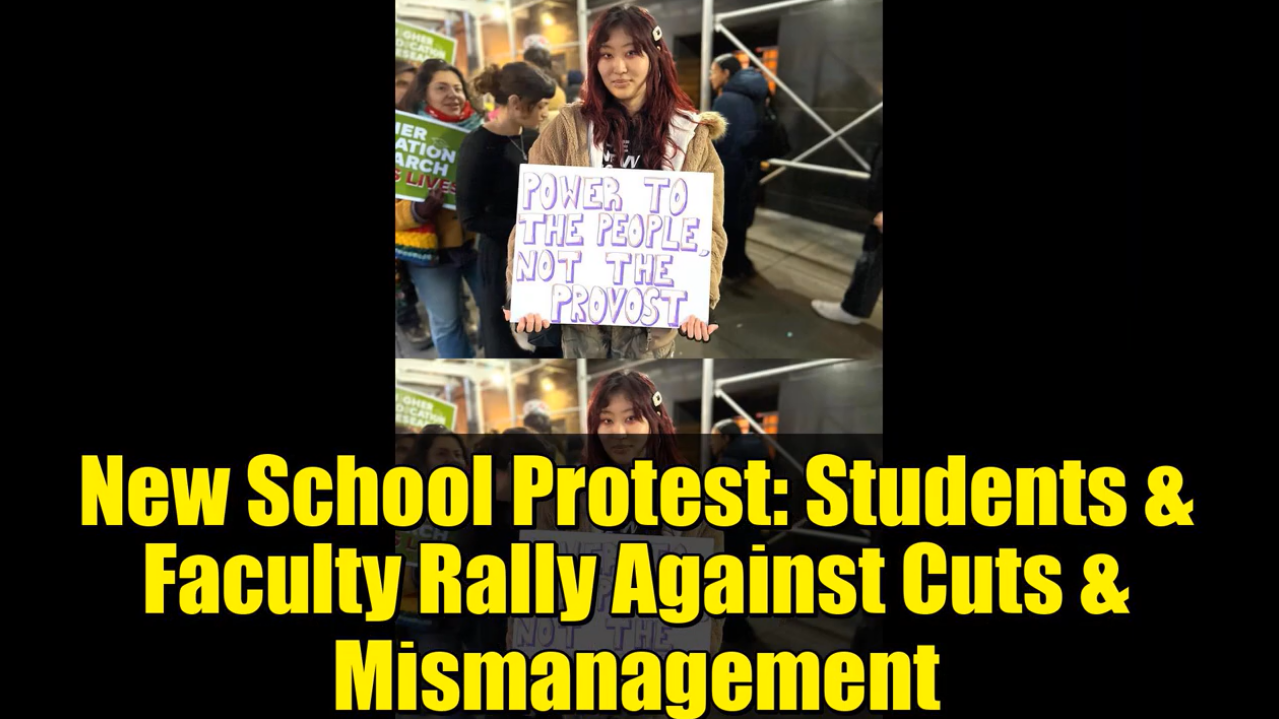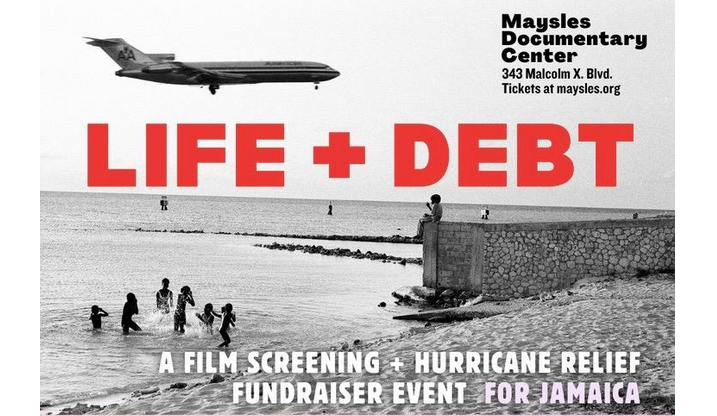By Brooklyn-Queens Expressway Environmental Justice Coalition
Photos: YouTube Screenshots\Wikimedia Commons
Brooklyn, NY – April 10th, 2024: In a resounding call for urgent action, the Brooklyn-Queens Expressway Environmental Justice Coalition held a press conference today demanding comprehensive measures to address the hazardous environmental and health crises stemming from the Brooklyn-Queens Expressway (BQE).

Gathered at the Triangle at the Intersection of 3rd Avenue and 16th Street in Brooklyn, the coalition, comprising residents, environmental justice advocates, organizations, allies, and elected officials, articulated a series of demands aimed at rectifying the dire impacts of the BQE on affected communities across Brooklyn and Queens.
The coalition specifically called for a comprehensive corridor-wide transformation of the BQE and for the immediate suspension of plans to rebuild the cantilever section of the BQE for another century of motor vehicles.. They emphasized the need for decisive action to correct environmental injustices, including addressing air pollution, traffic violence, and climate change affecting communities corridor-wide.
Furthermore, the coalition urged the approval and implementation of shovel-ready community-led plans such as the BQEGreen in Williamsburg and Sunset Park Greenway-Blueway, offering tangible solutions for a more sustainable and equitable BQE. Advocating for the dissolution of segmented planning in favor of a unified approach supporting community-led planning rooted in environmental justice principles for the entire BQE corridor.
The press conference saw the participation of elected officials, including Borough President Antonio Reynoso, Assemblywoman Jo Anne Simon, Assemblywoman Emily Gallagher, CM Lincoln Restler, CM Jennifer Gutiérrez, and State Senator Andrew Gournades. Representatives from various organizations, including El Puente, UPROSE, New York City Environmental Justice Alliance, 350 Brooklyn, and many others, were also in attendance.
The event included banners, signs, and a diverse assembly of community members, activists, and elected officials, highlighting the urgency of the coalition’s message.
Several from the Brooklyn-Queens Expressway Environmental Justice Coalition spoke about their concerns.
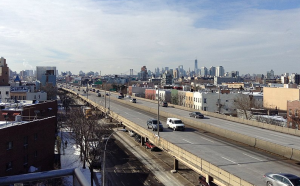
“It is critically important to implement community-led initiatives when creating once in a lifetime change to the Brooklyn-Queens Expressway (BQE). It’s time for community voices to lead the charge in reshaping our neighborhoods and reclaiming our environment for the betterment of us all. Projects like BQGreen serve as examples of how grassroots efforts can pave the way for sustainable and equitable change.”– Marco A. Carrión, Executive Director of El Puente.
“The BQE divides many neighborhoods, has displaced communities, and today is a major source of air pollution. We need a comprehensive plan that centers racial and climate justice for the corridor to ensure we do not repeat history. Now is the time for both the City and State to come together with communities along the corridor to reverse the harms Robert Moses committed decades ago,” said Kevin Garcia, Senior Transportation Planner for the New York City Environmental Justice Alliance. “This plan must guarantee we reduce our reliance on truck dependency and provide cleaner modes of transportation along the corridor and our city.”
“The BQE has dropped tons of toxic emissions into the lungs of generations of Black and Brown people while violently displacing the most vulnerable. Changing this injustice requires the smarts and political will that recognizes we are living in the age of climate change and that justice demands the transformative action necessary to create and invest in infrastructure that moves us away from harm and centers the health and safety of frontline communities. A comprehensive, frontline-driven planning approach in alignment with the Climate Leadership and Community Protection Act will put us on a path of environmental and transportation justice.” Elizabeth Yeampierre, Executive Director of UPROSE.
“The BQE-EJC represents a rare coming together of diverse communities and neighborhoods. What unites us is our plea for the city and state to seize this exceptional opportunity and rethink mobility to meet our public health, climate and economic development goals. For decades the BQE has torn through our city, bringing pollution, noise, congestion, traffic violence and filth to the literal doorsteps of hundreds of thousands of people. Today, we’re calling on New York City and New York State to immediately initiate a corridor-wide, holistic, and community-led planning process for the entire BQE that prioritizes public health, climate resilience, investments in transit and sustainable freight delivery, and fundamentally puts people first.” – Lara Birnback for Brooklyn Heights Association.
“For generations Red Hook residents have demanded change to the deadly corridor that runs along the BQE and serves as a main entryway to the neighborhood. The time is now for comprehensive, community-led planning that centers environmental justice communities such as ours. We join our allies in demanding decisive action to correct environmental injustices and an end to segmented planning.” – Michael Partis, Executive Director Red Hook Initiative
“There needs to be comprehensive studies of through traffic, particulate matter, health impacts and a state of the art transportation model of the entire BQE corridor. The DUMBO Neighborhood Alliance remains committed to the Cross Downtown Brooklyn Tunnel Proposal as a bold solution to all of the issues our surrounding communities are impacted by.” – Doreen Gallo, President, DUMBO Neighborhood Alliance.
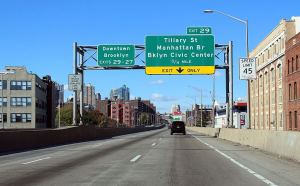
“Like all New Yorkers, the City’s millions of public transit riders need a just way – not more highway. Instead of acquiescing to the Adams plan, Governor Hochul and Senator Schumer must join with communities to craft a just transformation of the BQE from a blight to an asset. We can’t afford another repeat of the Van Wyck widening or compound the damage of the $5 billion already being spent on highway expansions across the city. Instead, with an abundance of transportation funds, New York must align our spending with our climate law and its equity mandate.” – Danny Pearlstein, Riders Alliance Policy & Communications Director.
“North Brooklyn Neighbors (NBN) is honored to be a member of the Brooklyn-Queens Expressway Environmental Justice Coalition (BQE-EJC) and supports its vision of a corridor-wide coalition centering the experiences, knowledge, voices and visions of Black, Brown and working class community members — those who have been most harmed and impacted by this stretch of Interstate 278 (I-278). For too long, North Brooklyn has suffered from air and soil polluted by numerous sources. The BQE, which runs through the middle of and divides North Brooklyn, is one of the biggest contributors to poor air quality and has contributed to the historical contamination of soil through decades of leaded gasoline emissions. It is long past time to reimagine what communities along the corridor could look like if the long-term health and well-being of historically marginalized communities is centered.” – Alan Minor Board Chairperson, North Brooklyn Neighbors (NBN).
“We need to prioritize people over highways, justice over congestion, and reclaim our communities, health, and future. A serious pause and examination must be done to avoid repeating the mistakes of the past. The redesign of the BQE must contribute to the alleviation of congestion and ensure lasting benefits for communities by reducing and eliminating environmental harms. It is only through a community-centered process that the most equitable solution to the BQE redesign can emerge.” – Renae Reynolds, Executive Director, Tri-State Transportation Campaign.
“The Cobble Hill Association (CHA) is pleased to be a part of this coalition to bring together the neighborhoods and communities most impacted by the BQE and NYC’s outdated transportation infrastructure and policies. Our community and the other communities along the Cobble Hill trench feel the daily impacts of traffic congestion including health and safety problems e.g. accidents, unsafe pedestrian access and crossings, air pollution and pollutants due to outdated and inefficient infrastructure. We ask that the State and City of NY come together to remedy the ills, past and present, of this highway and our transportation infrastructure by putting human health first. Remove the traffic from our streets and mitigate the impacts of highway infrastructure adjacent to our communities. We ask this in solidarity with our neighbors.” – Amy Breedlove for the Cobble Hill Association
“350Brooklyn is honored to be part of the BQE EJC. The BQE is an outdated, intrusive, and polluting piece of Robert Moses era infrastructure. The time is now to remedy the injustices of the past and not only rethink but redesign transit across this corridor, centering community voices and visions that reconnect communities while reducing the devastating and harmful emissions that affect the health and well-being of people living and working along the BQE.”– Lynn Neuman, Steering Committee, 350Brooklyn
“Growing up in Williamsburg, I know firsthand the wounds that the Brooklyn-Queens Expressway (BQE) has left behind in Brooklyn. I also know the incredible organizing power found up and down the corridor, where neighborhoods are mobilizing to address the expressway’s toxic pollution, dangerous truck traffic, and isolating infrastructure,” said Brooklyn Borough President Antonio Reynoso. “Our communities are coming together to demand comprehensive, community-led solutions to the decades-old problems left behind by the BQE, and I’m so proud to join the Brooklyn-Queens Expressway Environmental Justice Coalition in calling for the urgent action we need to uproot the racist and environmental damages caused by the BQE.”

“From Greenpoint to Bay Ridge, the BQE is an open wound slashed across our Brooklyn neighborhood. It’s time to finally heal it. I applaud the vision and tenacity of the Brooklyn-Queens Expressway Environmental Justice Coalition, and stand with them in their call for comprehensive measures to address sustainability and community health. Let’s seize this moment to plan for the public good.” – Assemblymember Emily .
“We need to realize a BQE that reduces emissions, creates much needed green space, and reunites neighborhoods that have long been divided by this Robert Moses relic. I’m proud to stand alongside this powerful new coalition of colleagues, community based organizations, and neighbors to demand solutions for the BQE that are rooted in environmental justice.” – Councilmember Lincoln Restler.
“True environmental justice for the neighborhoods that surround BQE requires a holistic approach that places community-driven initiatives at its core. By prioritizing sustainable solutions, reducing air pollution, improving public health, and fostering better connectivity, we can create a corridor that truly serves the needs of all and chips away at the decades of environmental injustices. It’s essential to invest in sustainable transportation options, embrace innovative solutions like zero-emission freight distribution, and ensure transparency and accountability in all planning processes.“ – Councilmember Jennifer Gutiérrez.
“Our communities have bore the brunt of this failed infrastructure and its surrounding policies or lack thereof. I’m grateful for the creation of this coalition. As our South Brooklyn neighborhoods continue to bear the brunt of the effects of a warming planet and weak responses, this coalition presents a comprehensive, interagency approach and a sensible list of demands to protect our people from a dire situation that will get worse. We must act now.” – Councilmember Alexa Aviles
“The Brooklyn-Queens Expressway cuts through the heart of our communities, and in its current, crumbling form, is an albatross around the neck of our collective future,” said State Senator Andrew Gounardes. “It’s time to reimagine the BQE corridor in a way that puts climate justice, economic justice and racial justice at the center of our transportation network. We need a comprehensive plan that reduces pollution, reconnects neighborhoods, and moves goods and people without further destroying the planet. That plan should be shaped by the communities—especially immigrant communities and communities of color—who have to live with it, which is why I stand with the Environmental Justice Coalition in their call for transformative action.”
The Brooklyn-Queens Expressway Environmental Justice Coalition remains committed to advocating for the rights of affected communities and promoting sustainable and equitable solutions to the challenges posed by the BQE.


